Participation & Inclusion
You cannot please all of the children all of the time. Or at least that is how it seems. Someone will always want to be vocal when it's too wet to climb trees, or when the mud slick is out of bounds, or when we can't go to the pond - or because we are AT the pond!
This week we went to the Wildlife Garden, a hedged in, gated area, where we have a good size pond. The children love pond dipping, I cart along a lot of the usual activities, and they get to explore a different small section of woods.
This was greeted by most as a happy surprise. Eager children wanted to get straight into pond dipping, and many spent the entire session kneeling by the water.
The trees here are young and vying for sunlight. They are tall and skinny and offer a lot of shade, which frankly for the first half of the week was a blessing. It does mean that none are suitable for climbing, a fact that drew groans from a few.
I explained we were here for the pond, we had climbable trees last week, and we'd have them again next week, but the pond isn't movable, so this is the trade-off. Some muttering ensued, "it's boring here" being the loudest, which I ignored as no one had ventured further than a few metres onto site!
Once the newt hunt began though...
Our newt eggs must have hatched in batches as we have varying sizes of tadpoles and fully formed newts. The tiny ones are the easiest to scoop up in a bowl so the comparisons started over 'big' and 'little' ones before anyone caught an adult. When they did the surprise was palpable and the hunt for more was on. Led at one point by the 'it's boring' child themselves!
The children are free to ignore the pond dipping activity, but very few do. Those a little cautious about water, or tadpoles, or what newts may be, still stand nearby watching, even if they never find the courage to hold one, or join in dipping. Very few exclude themselves from participation, many have a go before moving off to create a den, or wander back after doing something else for a while. Compared to our usual site space is limited and therefore so are some activities.
Introducing something new will frequently get a mixed review whichever site I am at! I know that the majority of children enjoy exploring the pond so I'm willing to take a week out and change sites to afford them the experience. For those who genuinely don't want to engage in even a few minutes of pond exploration, there are at least 8 standard activities, one extra activity, and new den spaces to investigate. Each class has up to 90 minutes to get to know the space and nearly all of the children did so.
An unexpected bonus this week was running the group alongside a child from one of the two classes from St. Nicholas that are based in Chartham School. These children have a variety of learning difficulties and are in our school building and grounds to allow maximum inclusion. Covid has hampered that an awful lot. Bubbles have pretty much wiped out their lesson interaction. Instead of joining the appropriate year group for Forest School, we have tried to timetable their own class sessions, but although it allows the FS experience, it doesn't aid integration.
This week a child who needs space and likes to wander the outdoors when possible wandered into our area. He watched, then joined in at a distance. Soon he was chatting across the pond, asking the class their names, introducing himself, giving tips on pond dipping, making observations about what he found, and focusing for 30 minutes or more on the task.
This from a child who likes the space outside, but isn't keen on insects or lizards or mice.... A lot of the outdoors worries him, but his tactile love of water made the pond alluring and once face to face with a newt the fear was overcome.
newt life cycle,
how to tell male from female,
what they eat,
what conditions they require to thrive,
how to handle them,
and how to keep water cool and plentiful, along with observation,
communication,
cooperation,
patience,
listening skills,
hand-eye coordination,
and compassion,
the children view the sessions as simply 'playing by the pond'.
In this 'play' they are open to include young children, adults, friends, peers, those they don't know very well, and children they have just met. Watch them on holiday and see how quickly they socialise with those who don't even speak the same language!
The seamless integration of this child into the periphery of our group is inclusion working at its best, and it's been missing since March 2020. It's hard to predict if it will be back in September. The June lockdown having been extended into July is not a good omen. A summer of fewer restrictions is bound to cause some kind of spike, so we wait and see what 'Bubble' protocol will be necessary when the new school year dawns.
The unexpected visitors continued as the week went on when a small grass snake was spotted swimming in the pond on a sunny day when the temperatures maxed out at 28oC! The next day it was unwittingly caught by Year6 who couldn't believe their eyes! It was the 'coolest thing ever' and well on its way to being a class pet if they'd been allowed.
Next week we are back at the usual site to try and manage the Amazonian effect the sun and deluge have had on the greenery. After that, we hope to migrate to a different area for the remainder of this term.
Hopefully, the care shown to the newts will extend to the caterpillars we have, and we can improve the butterfly garden before they transform. We ought to have some ideas on how to improve our tiny wildlife pond also.
I can't guarantee grass snakes or newts.
One thing I can guarantee though is that next week some children will be vocally disappointed that we are not by the big pond!
But as I said, you cannot please all of the children all of the time!
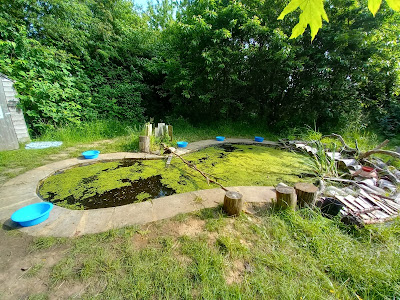
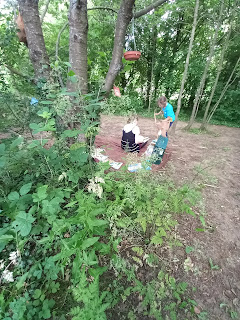



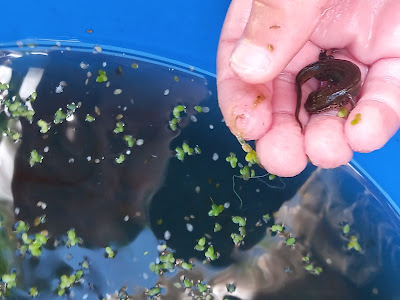




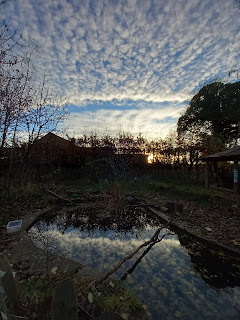
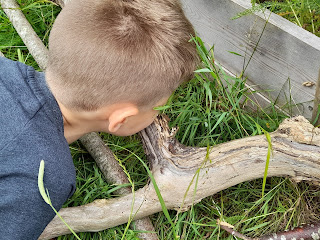

Comments
Post a Comment